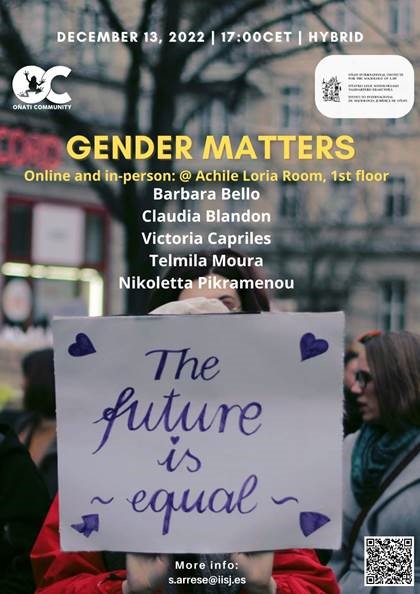
https://www.youtube.com/channel/UCzTTPby1MXuKbjphAXGsx2g
Moderator: Victoria Capriles
the Venezuelan migrant and refugee crisis and how Venezuelan women are affected differently because of gender stereotypes, being vulnerable to xenophobia and sexual exploitation.
1st Speaker: Barbara Bello
International Ph.D “Renato Treves” in Law and Society; Adjunct Professor at the Tuscia University (Viterbo, Italy) and Gender Analysis Consultant for Save the Children Italy.
Title: Doing Intersectionality in research and law
I will introduce the difficulty of “doing intersectionality'' and, if possible, present a co-edited Special Issue on the topic that will be out on Monday J Is it ok?
About myself: Books: Intersezionalità. Teorie e pratiche tra diritto e società (“Intersectionality. Theory and Practice in law and society”, 2020); Dal margine al centro. Giovani tra diritto e pratiche sociali (“From margin to center. Youth in Law and social practices”, 2021).
2nd Speaker: Claudia Blandon
Claudia Blandon is originally from Colombia but currently living in the United Kingdom. She is based at the University of Plymouth Institute of Education in the south West of England. Claudia has extensive experience conducting research with populations deemed vulnerable and in diverse contexts, including refugee camps. She has a background in International Human Rights Law, Anthropology and Sociology. Claudia‘s presentation draws on her doctoral research that explores the role Human Rights Education programmes play in shaping displaced women’s sense of empowerment and vulnerability.
Title: The praxis of human rights: deconstructing legal norms and human rights knowledge from the ground up
Short Summary of Research:
Research has shown that in contexts of displacement, understanding and respecting human rights related to women is fundamental in terms of employment, reproduction, healthcare, sexuality, education, family life and access to justice (Marcus, 2017). However, there is also evidence to suggest that human rights education programmes and legal infrastructures designed to empower women are not always having the intended effects of supporting agency (Bajaj et al., 2017).
Using a Feminist New Materialist (FNM) lens, this multi-disciplinary qualitative research in education and forced migration studies explores how displaced women in Colombia are engaging with legal and human rights knowledge to empower individuals and communities at grassroots levels. It documents the mechanisms and processes used to appropriate and/or challenge legal constructs, universal notions of human rights that shape their perceptions of empowerment and vulnerability.
3rd Speaker: Nikoletta Pikramenou
Nikoletta Pikramenou is a scholar and researcher with expertise on queer law and intersex rights. Since 2019, she has been also advocating for intersex rights as an intersex rights activist and ally.
Title: Intersex rights and activism in Greece and beyond
Short summary: In 2019, Nikoletta published the book ‘Intersex Rights. Living between Sexes’. The book was based on her doctoral thesis which was conducted at Aristotle University and was co-supervised by a member of Uppsala University. This research introduced the first global legal comparative study on intersex rights and focused on the multiple human rights violations that are committed against intersex persons around the world. The same year, she joined ‘Intersex Greece’, the only intersex-led organisation in Greece, as a legal expert and researcher. In 2022, Greece became the 5th country in the world to ban surgeries on intersex infants and children and ‘Intersex Greece’ was actively involved during the entire law-making process. During her presentation, Nikoletta will briefly present the violations of human rights committed against intersex people based on the findings of her book. At the same time, she will talk about her experience as an activist and elaborate on how the intersex rights movement can shape inclusive and equal societies through its active engagement in legal processes.
4th Speaker: Telmila Moura
Telmila Moura is originally from Brazil and is a PhD student in Sociology of the State, Law and Justice at the Faculty of Economics and “Centro de Estudos Sociais” at the University of Coimbra, Portugal. She is a lawyer in family law in São Paulo in a private office and guiding lawyer at the “Departamento Jurídico XI de Agosto”, an entity that provides free legal assistance to needy population by the students of the Faculty of Law of the University of São Paulo.
Title: The role of advocacy in disputes about parental responsibilities: its influence on the choice of custody regime in a city of São Paulo
Short Summary: Through legal changes regarding the custody regime through the implementation of shared custody in 2008 and 2015 in Brazil, based on the researcher's experience as a family lawyer, there is a certain resistance in determining joint custody by the Brazilian Courts. Thus, the researcher intends to verify what is the role of advocacy in choosing the custody regime in divorce cases in the city of São Paulo, from a gender and social perspective, given the contrasts of a metropolis that coexists with wide social inequality .



